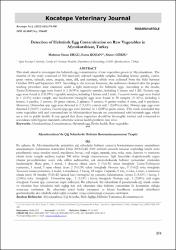Detection of helminth egg contamination on raw vegetables in Afyonkarahisar, Turkey
Künye
Erez, M. S. , Kozan, E. & Göksu, A. (2022). Detection of Helminth Egg Contamination on Raw Vegetables in Afyonkarahisar, Turkey . Kocatepe Veterinary Journal , 15 (4) , 374-380 . DOI: 10.30607/kvj.1158402Özet
This study aimed to investigate the helminth egg contamination of raw vegetables grown in Afyonkarahisar. The material of the study consisted of 508 randomly selected vegetable samples, including lettuce, parsley, carrot, green onion, spinach, cress, arugula, mint, dill, and purslane, which were collected from the field between October 2018 and September 2019. According to the relevant literature, the sediments obtained after the proper washing procedure were examined under a light microscope for helminth eggs. According to the results, Taenia/Echinococcus eggs were found in 2 (0.39%) vegetable samples, including 1 lettuce and 1 dill. Toxocara spp. eggs were found in 2 (0.39%) vegetable samples, including 1 lettuce and 1 mint. Toxascaris leonina eggs were found in 1 (0.2%) rocket sample, and hookworm/strongylid eggs were found in 58 samples (11.42%), including 4 lettuce, 6 parsley, 3 carrots, 18 green onions, 2 spinach, 9 cresses, 4 garden rocket, 6 mint, and 6 purslanes. Moreover, Dicrocoelium spp. eggs were detected in 2 (3,63%) carrots and 1 (2,04%) rocket, Moniezia spp. eggs were detected 2 (3.63% ) carrots, Fasciola spp.eggs were detected in 1 (2.08%) green onion. This study concluded that some vegetables sold and consumed raw in Afyonkarahisar bazaars are contaminated with helminth eggs, which are a risk to public health. It was agreed that these vegetables should be thoroughly washed and consumed in accordance with hygiene standards, otherwise serious health problems may arise. Bu çalışma ile Afyonkarahisar'da yetiştirilen çiğ sebzelerin helmint yumurta kontaminasyonunun araştırılması amaçlanmıştır. Çalışmanın materyalini Ekim 2018-Eylül 2019 tarihleri arasında tarladan toplandığı haliyle semt pazarlarında satışa sunulan marul, maydanoz, havuç, yeşil soğan, ıspanak, tere, roka, nane, dereotu ve semizotu olmak üzere rastgele seçilmiş toplam 508 sebze örneği oluşturmuştur. İlgili literatürler doğrultusunda uygun yıkama prosedüründen sonra elde edilen sedimentler, ışık mikroskobunda helmint yumurtaları yönünden incelenmiştir. Buna göre, 1 marul, 1 dereotu olmak üzere 2 (%0.39) sebze örneğinde Taenia/Echinococcus yumurtası, 1 marul, 1 nane olmak üzere 2 (%0.39) sebze örneğinde Toxocara spp., 1 (%0.2) roka örneğinde Toxascaris leonina yumurtası, 4 marul, 6 maydanoz, 3 havuç, 18 soğan, 2 ıspanak, 9 tere, 4 roka, 6 nane, 6 semizotu olmak üzere 58 örnekte (%11.42) kancalı kurt/strongylid tip yumurta bulunmuştur. Ayrıca 2 (3.63% ) havuç, 1 (2.04%) roka örneğinde Dicrocoelium spp., 2 (3.63% ) havuç örneğinde Moniezia spp., 1 (2.08%) yeşil soğan örneğinde Fasciola spp. yumurtası tespit edilmiştir. Bu çalışmada Afyonkarahisar il pazarlarında çiğ olarak satılan ve tüketilen bazı sebzelerin halk sağlığı için risk oluşturan olan helmint yumurtaları ile kontamine olduğu sonucuna varılmıştır. Bu sebzelerin yeteri kadar yıkanması ve hijyen kurallarına uyularak tüketilmesi gerekmektedir; aksi takdirde ciddi sağlık sorunları ortaya çıkabileceği sonucuna varılmıştır.



















